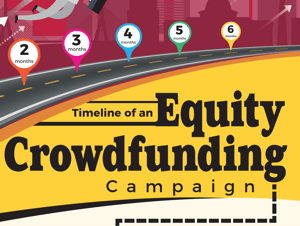
1. Decide how much to raise
This should be a function of how far along your company is in its development. Go with a small raise under $107,000 if you’re just starting out. If you raise more than that, you'll need to provide a review letter from an independent accountant. If you raise more than $1.07 million, you'll need audited financial statements. It’s better to raise a smaller amount and have a successful raise. Once you’ve demonstrated traction, you can come back and raise more!
2. Decide which funding portal will host your offering
Each portal is unique in terms of the fees they charge to raise capital and the minimum investment required by investors. All equity crowdfunding portals charge an upfront application fee plus a success fee, or a percentage of the money that was raised. Some portals specialize in certain verticals. For example, RedCrow specializes in the medical sector. ValueSetters partners with Netcapital, which raises funds for companies across a broad spectrum of industries.
3. Fill out the application with the portal
Each portal has unique application requirements, but your portal should collect all information required by the SEC, including financial statements, articles of organization, business plan, funding history, use of proceeds, and minimum and maximum raise amounts. The portal will then file the application directly with the SEC. During the approval period, you’re not allowed to “condition the market,” or let anyone know you’ll be launching your equity crowdfunding campaign on a certain date.
4. Create your offering page and video
Think of the offering page as the landing page for your campaign. It should include:
- an introduction
- the problem your company is going to solve
- the size of market opportunity
- the competitive landscape: who your competitors are and the size of their market share
- any competitive advantages your company offers
- your business model
- background on team members
- how you’re going to use the money
- Include a 60-90 second video that showcases your company. This could include an interview with your CEO or an animation that highlights the benefits of your innovation.
5. Create your marketing plan
This is the most important part of your campaign, because this is how you will spread the word to investors. Remember, you can’t “condition the market” before your fundraising campaign launches, but you want to be prepared once it does. Have a plan ready that encompasses all forms of digital marketing, including search engine marketing, display advertising, social media, and email marketing. Consider hiring a consultant like ValueSetters who specializes in digital marketing for equity crowdfunding.
6. Launch the campaign and begin marketing
We recommend running your campaign for at least 90 days but you can extend it to meet your needs. The more you raise, the longer it will take to reach your goal.
7. Escrow
Investor funds are held in escrow until the end of your campaign. If the raise is successful (the minimum amount you want to raise is reached), the escrow agent will release the funds to you. This process takes about 30 days after the completion of the campaign.
The entire process will take about 6 months on average, but can take longer if you plan to raise a large amount.
View our infographic Timeline of an Equity Crowdfunding Campaign to learn more.

Kathy Kraysler · Author
CMO, ValueSetters

